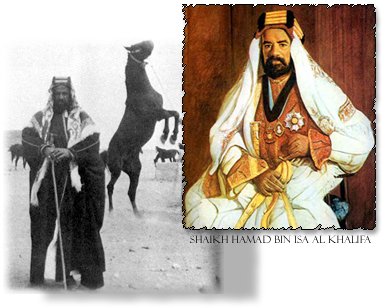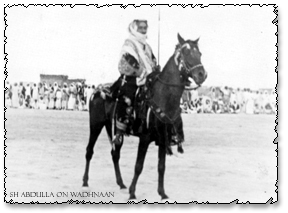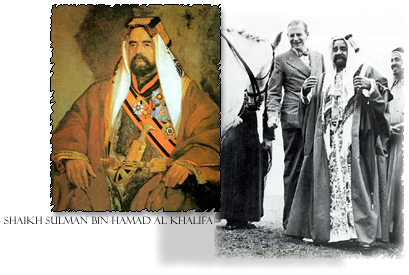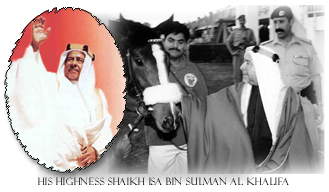|

To write a history of
the Arabian horses of Bahrain today, it is essential to compile a short
history of the ruling Al-Khalifa family, as the two are synonymous. The
family descend from the great Anaza tribe and count Al-Haddar, South
Najd in Central Arabia, as their ancestral home.
|
 |
In early 17th
century, the plain of Al-Haddar, East of Al-Afflage Ridge and near
Wadi Al-Dowaseer, was full of villages and gardens inhabited by the
Jumailah-Wail branch of the Anaza tribe. In about the year 1670
A.D., differences took place among the members of the clans, which
resulted in the separation and migration of a division thereof. In
this division were the ancestors of the Al-Khalifa, Al-Sabah, Al-Fadhel
and Al-Jalahma, and their other kinsmen and supporters who migrated
with them. |
Migration brought them
to the East Coast and the Gulf Region. Various other tribesmen joined
them and all formed a united confederacy and called themselves by the
name of Al-Utub. Consequently they were known as Banu-Utuba. Unions of
this kind were common among the different tribes in Arabia and when such
greater confederacies were formed, all the tribes, clans or individuals
felt as if they were members of one common ancestor. From Al Hasa
province the Banu-Utub went to Qatar Peninsula and settled in Freha in
the year 1672 and from there they made their first brief occupation of
Bahrain in 1700.
Around the year 1708 they settled and founded the city of Kuwait. The
founder of the present Al-Khalifa family was known as Shaikh Khalifa bin
Mohammed, who left after his death a son, Shaikh Mohammed bin Khalifa.
In mid 18th century
the Al-Khalifa, led by Shaikh Mohammed bin Khalifa, parted from their
cousins the Al-Sabah, the present ruling family of Kuwait. Returning
south, they established the fortified settlement of Zubara on the North
West coast of Qatar. In 1768 Shaikh Mohammed completed the building of
his fort in Zubara and called it Sabha, which means dawn. After his
death, his eldest son Khalifa succeeded him as Shaikh of Zubara. In his
time Zubara expanded and flourished, especially after the destruction of
El-Basra in Southern Iraq, when numerous merchants emigrated from Basra
and settled in Zubara. Al-Basra was sacked by Sadiq Khan El-Zandy,
brother of Karim Khan, the ruler of Persia.

In 1783 Shaikh Nasser
bin Mathcoor, the Governor of Bahrain and Abu-Shohar, attacked Zubara.
It is said that most probably the fear of the new state's growth, and
the competition in pearl fishing areas and in commercial activity led
him to action. At that time Shaikh Khalifa was away in Mecca on
pilgrimage and his brother Shaikh Ahmed was in charge of the cause of
Zubara. Nasser bin Mathcoor lost the battle at Zubara and Shaikh Ahmed
with his followers pursued the defeated army and seized Awal. Awal is
the old name for the island of Bahrain. Shaikh Khalifa died in Mecca on
his pilgrimage whereupon Shaikh Ahmed became the first Al-Khalifa ruler
of the Bahrain Islands.
Modern history of
Bahrain is very much alive today starting with Shaikh Ahmed the
Conqueror. For the next half a century many battles were fought on land
and sea between the Shaikhs of Bahrain and the Sultans of Muscat. They
also fought with their Najdi brethren of the Wahabe sect, and their
former ally Rahma Al-Jalahma who had become a notorious sea pirate in
the Gulf. Shaikh Ahmed died around 1796 and was succeeded by his sons
Sulman and Abdulla, who ruled jointly until 1825 when Sulman died.
Abdulla later ruled jointly with his nephew Khalifa bin Sulman, until
the latter's death in 1834. Khalifa's son Mohammed, born in 1813, was
perhaps one of the most colourful personalities in his time. He was
associated with his granduncle Shaikh Abdulla in the Shaikship, then
made war on Abdulla and was expelled from Bahrain. Shaikh Abdulla
established the Kuheila't
Jellaby strain of horse in Bahrain and during his reign they
multiplied. Mohammed bin Khalifa then invaded Bahrain 1843 and drove out
his granduncle Abdulla who settled in Arabia proper and founded the Al-Abdulla
branch of the family. Shaikh Mohammed was a contemporary of Abbas Pasha
of Egypt and it was he who sent many mares of the
Jellaby and
Dahman strain to Abbas
Pasha. Perhaps Shaikh Mohammed was not a popular ruler, because he had
to flee from Bahrain and his brother Ali became the new Shaikh. Shaikh
Ali reigned for only one year, as his brother Mohammed, with his
followers, invaded Bahrain again to seize power. A battle on horseback
was fought on Rufa hill where Ali was killed. Alas, Shaikh Mohammed was
not accepted as the new Shaikh, was expelled again and died in the Hijaz
in 1890. He left 26 sons.
 |

